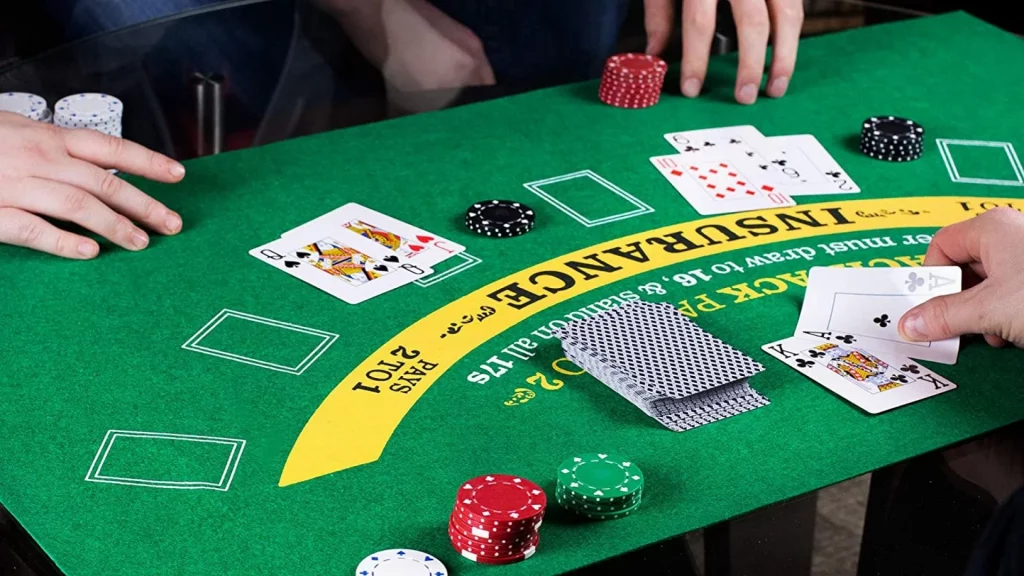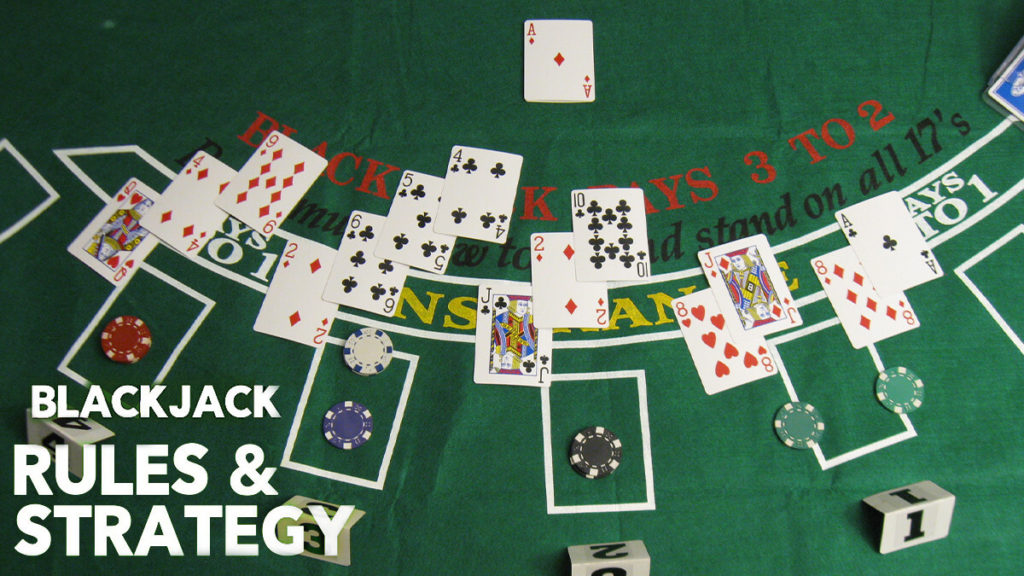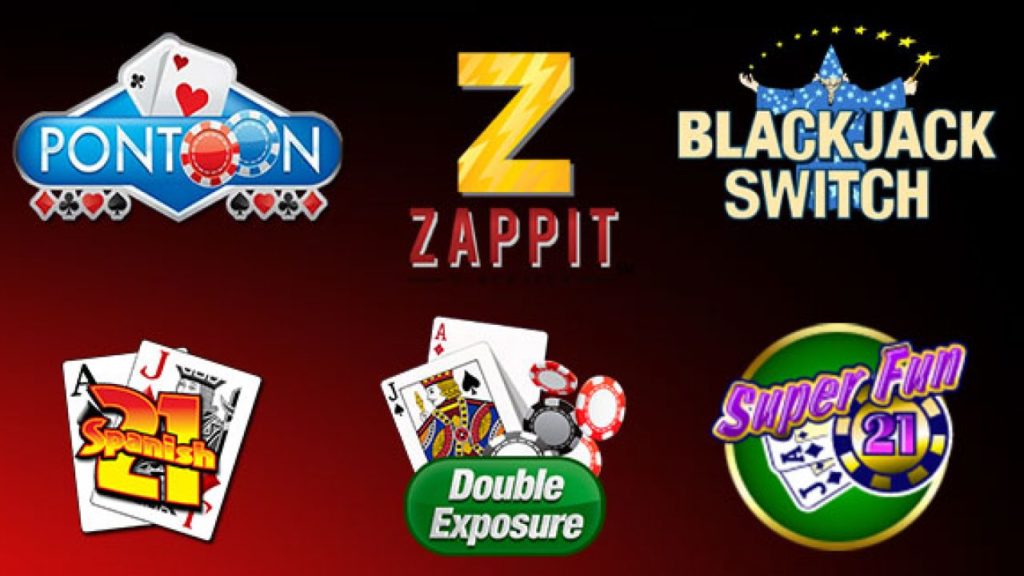Blackjack is a game that is played with a deck of cards. The game has a simple objective: to get a hand worth 21 points or as close to 21 points as possible without exceeding it. If a player’s hand is closer to 21 than the dealer’s hand, they win. When the situation is reversed, the dealer wins. If a player or dealer’s hand exceeds 21, they lose.
Blackjack is a game that is played in casinos all over the world. It is one of the most popular casino games because it offers players a chance to win big with the right strategy. The game has a low house edge, which means that players can expect to lose less money over time compared to other casino games.
The Rules of Blackjack
The rules of blackjack are straightforward. The game is played with one or more decks of cards, depending on the casino. Each card has a value, and the objective of the game is to get a hand with a value of 21 or as close to 21 as possible without going over.

At the beginning of the game, the player places a bet. The dealer then deals two cards to the player and two cards to himself, with one card face-up and the other face-down. The player can then choose to “hit,” which means to take another card, or “stand,” which means to keep their current hand. The player can continue to hit until they reach 21 or decide to stand.
The dealer follows the same rules as the player, but with some variations. The dealer must hit until their hand is worth at least 17. If the dealer’s hand exceeds 21, the player wins. On the other hand, if the dealer’s hand is closer to 21 than the player’s hand, the dealer wins.
The Value of the Cards
In blackjack, the value of the cards is as follows:
- Ace: 1 or 11
- Face cards (King, Queen, Jack): 10
- Number cards: face value
The Ace is an important card in blackjack as it can be counted as 1 or 11. For example, if a player has an Ace and a 5, the Ace can be counted as 11, making the hand worth 16. If the player then draws a 10, the hand is worth 26, which exceeds 21, and the player loses. However, if the player has an Ace and a 6, the Ace can be counted as 1, making the hand worth 7. If the player then draws a 10, the hand is worth 17. This is a good hand to have in blackjack.
How to Play Blackjack?
To play blackjack, the player must first place a bet. The dealer then deals two cards to the player and two cards to himself, with one card face-up and the other face-down. The player can then choose to “hit,” which means to take another card, or “stand,” which means to keep their current hand.
If the player’s hand is worth 21 points, the player has a blackjack and automatically wins, unless the dealer also has a blackjack. If the dealer’s face-up card is an Ace, the player can choose to take insurance. Insurance is a side bet that the dealer has a blackjack, and it pays 2 to 1.
If the player’s hand is worth less than 21, the player can continue to hit until they reach 21 or decide to stand. If the player’s hand exceeds 21, they lose.
The dealer then reveals their face-down card. If the dealer’s hand is worth less than 17, the dealer must hit until their hand is worth at least 17. If the dealer’s hand exceeds 21, the player wins. However, if the dealer’s hand is worth more than 17 but less than the player’s hand, the player wins. If the dealer’s hand is worth more than the player’s hand, the dealer wins.
Basic Strategy for Blackjack
The basic strategy for blackjack involves using mathematical calculations to determine the best move in any given situation. For example, if the player has a hand worth 12-16 and the dealer’s face-up card is 2-6, the player should stand. On the other hand, if the player has a hand worth 5-8 and the dealer’s face-up card is 7-Ace, the player should hit.
The basic strategy is based on the player’s hand and the dealer’s face-up card. By using a basic strategy, the player can reduce the house edge and improve their chances of winning. Basic strategy charts are available online and in casino gift shops.
Advanced Blackjack Strategies
Advanced blackjack strategies involve techniques like card counting, shuffle tracking, and hole carding. Card counting involves keeping track of the cards that have been dealt. Then, using that information to determine the probability of certain cards being dealt with in the future. Shuffle tracking involves following the shuffle pattern of the cards and predicting where certain cards will end up. Hole carding involves using information about the dealer’s face-down card to gain an advantage.

These advanced strategies can be effective but are difficult to master. Casinos have taken steps to prevent these strategies, such as using multiple decks and shuffling the cards more frequently. It is also important to note that card counting is not illegal but can result in being asked to leave the casino.
Tips for Playing Blackjack
Here are some tips for playing blackjack:
- Always use basic strategy: By using basic strategy, players can reduce the house edge and improve their chances of winning.
- Don’t take insurance: Insurance is a side bet that the dealer has a blackjack. It pays 2 to 1, but it is not a good bet in the long run.
- Avoid side bets: Side bets like Perfect Pairs and 21+3 have a high house edge and are not recommended.
- Manage your bankroll: Set a budget for your blackjack session and stick to it. Never bet more than you can afford to lose.
- Take breaks when necessary: Taking breaks can help you stay focused and make better decisions.
Blackjack Variants
There are many blackjack variants, each with unique rules and gameplay. Some popular variants include:
- Spanish 21: A variant of blackjack played with a Spanish deck of cards that removes the 10s. This increases the house edge but introduces new bonus payouts and special rules.
- Pontoon: A British version of blackjack that is played with two decks of cards and unique terminology for the game’s actions.
- Double Exposure Blackjack: A variant in which both of the dealer’s cards are face-up, giving players more information to base their decisions on.

Blackjack Tournaments
Blackjack tournaments are events where players compete against each other to win a prize pool. The tournaments are usually played over several rounds, and the player with the most chips at the end of the final round wins. Tournaments can be played in a variety of formats, including elimination, shootout, and heads-up.
The History of Blackjack
The origins of blackjack are unclear, but the game has been played in various forms for centuries. The modern version of the game is believed to have originated in France in the 1700s, under the name “Vingt-et-Un” (which means 21 in French). The game then spread throughout Europe and eventually made its way to the United States.
Blackjack Glossary
- Hit: Take another card.
- Stand: Keep the
- Double down: Double the initial bet and take one more card.
- Split: Separate a pair into two hands.
- Surrender: Give up half of the bet and leave the game.
FAQs
Conclusion
Blackjack is a classic casino game that offers players the chance to win big with the right strategy. By understanding the game’s rules, using basic strategy, and avoiding common mistakes, players can improve their chances of winning. With a wide range of variants and tournament formats available, blackjack offers endless possibilities for players to test their skills and have fun at the same time. Whether playing at a brick-and-mortar casino or an online casino, blackjack remains a popular choice among players of all skill levels.
